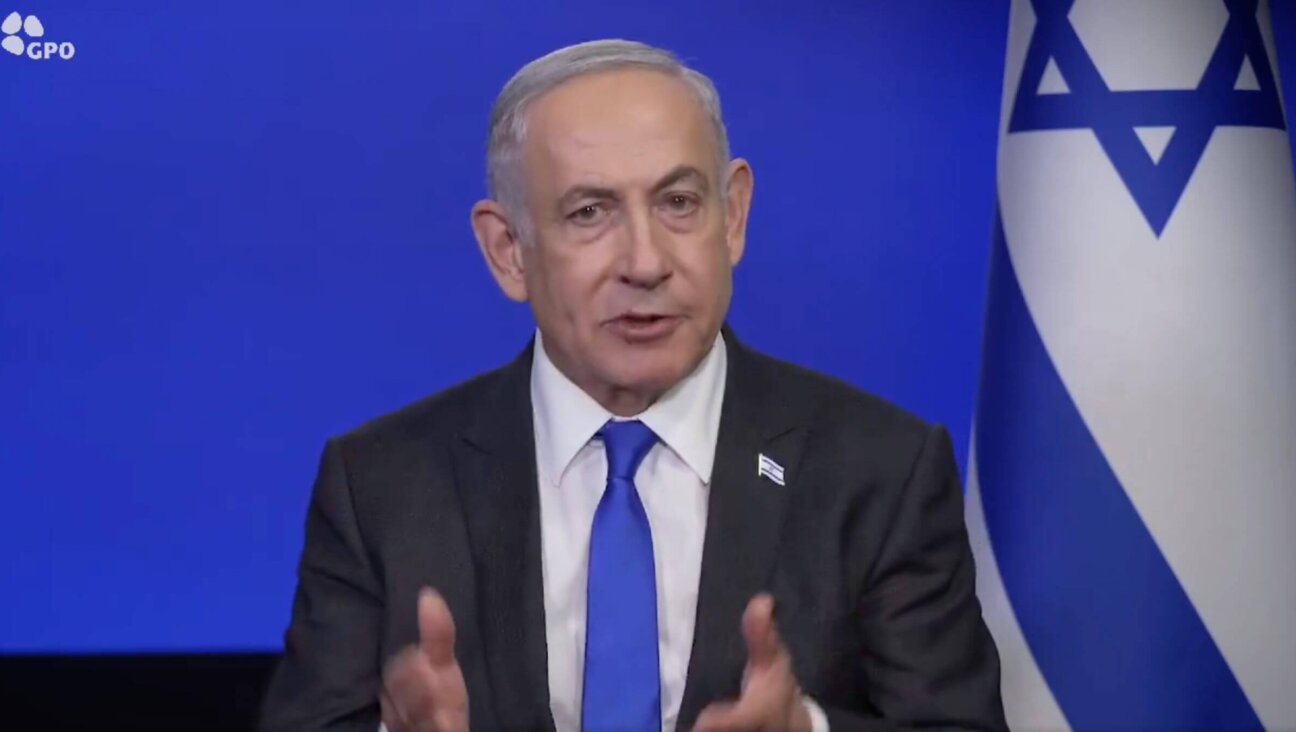Behind Bars
There’s a particularly chilling scene about two-thirds of the way through “HotHouse,” a new documentary that examines the lives of Palestinians serving time in Israeli security prisons.
The film’s Israeli director, Shimon Dotan, asks female prisoner Ahlam Tamimi how many children were killed in the August 2001 terrorist attack on the Sbarro pizzeria in Jerusalem. (Tamimi, a former newscaster for Palestinian TV, admits that she selected Sbarro as a terrorist site, and even delivered the suicide bomber there before leaving to read the news on air that day.) “Three,” she says. “Eight,” Dotan replies. “Eight? Eight,” Tamimi repeats, her smile betraying no emotion at the loss of innocent life.
Tamimi’s lack of remorse — which she expresses explicitly elsewhere in the film — is just one of the jarring moments in “HotHouse,” which is screening June 25 at the Human Rights Watch International Film Festival in New York City and airing June 27 on HBO/Cinemax. The winner of a Special Jury Award at Sundance earlier this year, “HotHouse” is framed by the 2006 Palestinian elections, which Hamas won even though (or perhaps because) Israel held more than a dozen of its candidates in prison.
Dotan’s film focuses on how the jails politicize the prisoners. Cells, for example, are divided into Fatah and Hamas factions — with both groups having separate representatives to the prison warden. The two factions appear to get along well in jail, but are they so chummy now that their parent organizations are fighting a near-civil war in Gaza? The prisoners raise each other’s political consciousness and teach each other Hebrew. Some are educated, even at The Hebrew University of Jerusalem, while they are imprisoned. “I think that the Palestinian people have turned the Israeli jails into academies and universities,” says former prisoner Samir Masharawi, who served eight-and-a-half years in Israeli jails.
Both Israelis and Palestinians assert that the congenial atmosphere helps prisons run more smoothly, though at first glance one wonders if the jail time education and the status the prisoners receive in Palestinian society only make them more effective fighters against the Jewish state. But some argue that prison experience can bring the two sides closer together. Previous prisoners “got to know the Israelis — and not through gunsights,” said Ofer Lefler, a colonel who is a spokesman for the Israeli Prisons Authority. “And they realized that the State of Israel cannot be eliminated, certainly not by terror.”
At times, the prisons give off an uncomfortably utopian shine. The jail cells have the odd feel of a camp cabin; several prisoners live together in a room, sleeping in bunk beds. Dotan’s camera follows the prisoners around in their boring but oddly peaceful daily lives: They eat, joke, wash up, listen to Walkmans, even exercise. (The access granted Dotan will seem unbelievable to American viewers: It is difficult to imagine anyone getting this sort of window into Guantanamo Bay.)
Dotan also highlights the realities of jail life and of the conflict itself. Many of his shots take place through gates and bars, and he frequently shows lockdowns and searches. When they introduce themselves throughout the film, terrorists from both factions announce their crimes. Nor does Dotan shy away from displaying the radicalism pervading Palestinian society. In one scene, an older woman who is visiting the prisoners yells, “The Jews and the United States are the same thing,” before screaming “Islam is the solution” and calling for applause for Allah.
Still, as viewers get to know the prisoners as individuals, there’s an almost inevitable humanization that takes place. O’thman Musleh, a Fatah member who has been imprisoned for 23 years, says that after all the in-prison exposure to Israeli media, “you become an expert on what’s going on between the nations, on when you need to exert influence, how to find a solution.” Certain Jewish and pro-Israel viewers will likely cringe, if not turn angry, as this humanization takes place, not least because carnage from the horrific attacks perpetrated by these terrorists is shown just once — and then only for a few seconds.
Indeed, late in the film, Fares Jad, a “failed” suicide bomber, tells Dotan that he hopes to raise children after he is released, so that he can prepare them for suicide missions. Dotan says that he hopes Jad doesn’t raise his children this way. Despite the filmmaker’s best intentions, however, it’s hard to feel optimistic that his words will have any sway.
Peter Ephross is a reviewer for Publishers Weekly, as well as for other publications and Web sites. He was a longtime editor for JTA.

I hope you appreciated this article. Before you go, I’d like to ask you to please support the Forward’s award-winning journalism this Passover.
In this age of misinformation, our work is needed like never before. We report on the news that matters most to American Jews, driven by truth, not ideology.
At a time when newsrooms are closing or cutting back, the Forward has removed its paywall. That means for the first time in our 126-year history, Forward journalism is free to everyone, everywhere. With an ongoing war, rising antisemitism, and a flood of disinformation that may affect the upcoming election, we believe that free and open access to Jewish journalism is imperative.
Readers like you make it all possible. Right now, we’re in the middle of our Passover Pledge Drive and we still need 300 people to step up and make a gift to sustain our trustworthy, independent journalism.
Make a gift of any size and become a Forward member today. You’ll support our mission to tell the American Jewish story fully and fairly.
— Rachel Fishman Feddersen, Publisher and CEO
Join our mission to tell the Jewish story fully and fairly.
Only 300 more gifts needed by April 30






















